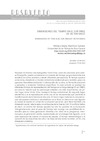Identificador persistente para citar o vincular este elemento:
https://accedacris.ulpgc.es/jspui/handle/10553/132132
| Título: | Dimensiones del tiempo en El sur (1983), de Víctor Erice | Otros títulos: | Dimensions of Time in El Sur(1983) by Víctor Erice | Autores/as: | Martínez Sariego, Mónica María | Clasificación UNESCO: | 620301 Cinematografía | Palabras clave: | El Sur Víctor Erice Tiempo Guerra Civil Exilio interior, et al. |
Fecha de publicación: | 2024 | Publicación seriada: | Pasavento-Revista De Estudios Hispanicos | Resumen: | El director cinematográfico Víctor Erice, autor de una breve pero valio-sa filmografía, puede considerarse un cineasta del tiempo, ya que desarrolla esta temática en varios sentidos y desde diferentes perspectivas. El tiempo aparece como tema, dotado de un hondo simbolismo existencial, pero también, pese a la aparente “desreferencialización” o abstracción de su obra, en forma de alusiones a episodios y contextos históricos específicos. En este artículo se analizan las diferentes formas de representación del tiempo en el largometraje El sur (1983), así como la relación que los personajes entablan con este. Examinamos, en pri-mer lugar, cómo Víctor Erice maneja el tiempo extratextual. En segundo lugar, atendemos a la temporalización como una de las herramientas que posibilita la transformación de la historia en discurso. En tercer lugar, tratamos la reconstruc-ción del pasado histórico e intrahistórico en el filme: el silencio en que Agustín se instala se explica en virtud de su situación personal, pero tiene también una dimensión social, relacionada con el trauma de la Guerra Civil. El conflicto bélico (es decir, un evento del tiempo pasado) ha roto los puentes de comunicación intergeneracional, pero el paso del tiempo trae consigo una posibilidad de re-dención para la nueva generación (Estrella y los niños de la posguerra), mien-tras que a la generación adulta, representada por el protagonista Agustín, no le cabe esperanza de superar el trauma del pasado. El tiempo meteorológico y la sucesión de las estaciones del año o las fases del día tienen también, en fin, una dimensión simbólica The film director Víctor Erice, author of a brief but valuable filmography, can be considered a filmmaker of time, as he develops this theme in various senses and from different perspectives. Time appears as a theme, endowed with deep existential symbolism, but also, despite the apparent “dereferentialization” or abstraction of his work, in the form of allusions to specific historical episodes and contexts. This article analyzes the feature film El sur (1983) to examine the different forms of representation of time, as well as the characters’ relationship with time. We first examine how Víctor Erice handles extratextual time. Then we delve into the discussion of temporalization, viewed as a narrative device that enables the transformation of history into discourse. Thirdly, the reconstruction of the historical and intrahistorical past in the film is addressed. Agustín’s withdrawal can be explained because of his personal situation, but it also has a social and political dimension related to the trauma of the civil war. The war conflict (i.e., an event of the past) brought disastrous effects for intergenerational communication, but the passage of time brings a possibility of redemption for the new generation (Estrella and the children of the post-war period), while the adult generation, represented by Agustín, has no hope of overcoming the trauma of the past. Finally, the symbolic dimension of the weather and the succession of the yearly seasons also have a symbolic dimension. |
URI: | https://accedacris.ulpgc.es/handle/10553/132132 | ISSN: | 2255-4505 | DOI: | 10.37536/preh.2024.12.1.2020 | Fuente: | Pasavento [EISSN 2255-4505], v. 12 (1), p. 125-141, (Diciembre 2024) |
| Colección: | Artículos |
Los elementos en ULPGC accedaCRIS están protegidos por derechos de autor con todos los derechos reservados, a menos que se indique lo contrario.
